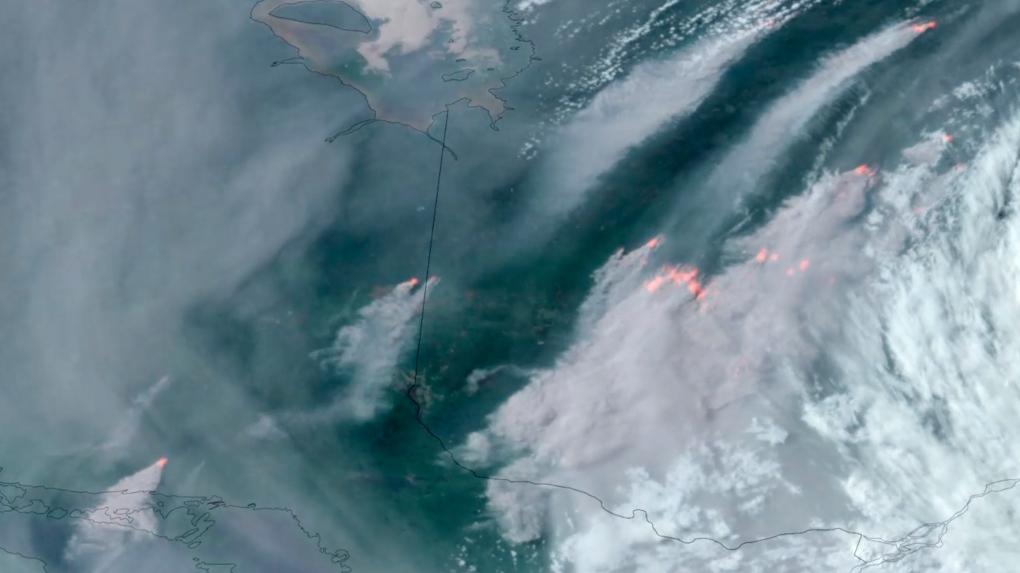More evacuations in Quebec as record-breaking fires continue to burn
Quebec's wildfire season, which has forced thousands from their homes and left other communities on high alert, is the worst on record, officials said Wednesday,
Premier François Legault told reporters in Quebec City that the areas in the greatest danger were in northern Quebec and the neighbouring Abitibi region, where significant rainfall wasn't expected until Monday. About 11,400 people have already been forced from their homes in the area because of persistent and unpredictable wildfires.
Residents shouldn't expect to be able to return home before the middle of next week, Legault warned.
"I want us all to be realistic so that we don't see things through rose-coloured glasses," the premier said. "For the moment, we do not expect rain for the next few days."
Evacuation orders were issued Tuesday night for the northern Quebec town of Chibougamau and the nearby Cree community of Oujé-Bougoumou.
The premier said the northern Cree community of Mistissini, located 550 kilometres north of Montreal, would likely be evacuated on Wednesday, resulting in another 4,000 displaced people.
But later in the day, Mistissini Chief Michael Petawabano said his community remains safe and asked residents to wait for instructions from Cree officials.
"I know it's hard sometimes, panic may set in, but we would really appreciate if you would wait for our reports," Petawabano said in a broadcast published on the community's Facebook page. "Legault does not run our community."
He said community leaders are in contact with Quebec's forest fire prevention agency, SOPFEU, which is monitoring the fire.
Mistissini remains on alert he said, and the local clinic may consider moving some vulnerable people with health issues. He added that the school will close and he asked people to conserve gasoline and electricity because the fire has damaged a power line to the community.
The northern town of Chapais, Que., risked being evacuated again, and some parts of Senneterre, Que., were also threatened by the flames, Legault said.

Chapais Mayor Isabelle Lessard asked residents to be prepared to leave if the situation deteriorates, adding Wednesday that residents would be offered shelter in St-Félicien, Que., about 250 kilometres southeast. About 800 people from the town's southern sector were forced from their homes for five days last week.
On Tuesday, Chibougamau Mayor Manon Cyr told the town's roughly 7,500 residents to head to Roberval, Que. — about 250 kilometres away — if they didn't have friends or family elsewhere who could take them in. In Oujé-Bougoumou, about 800 people were ordered to leave and advised that shelter would be provided nearly 400 kilometres to the southeast, in Chicoutimi, Que.
In the Roberval area, residents used a Facebook page to find evacuees places to stay. Joanie Riendeau one of five volunteers running the page, said that by noon, there were only 40 people remaining at a temporary shelter in the Roberval arena, and that all of them had chosen to stay.
"In less than 16 hours after the evacuation notice, everyone was able to have a comfortable space to settle in," she said in an interview.
While people's property remains at risk, she said there's been an outpouring of generosity from people in the area. "What we've gained in this catastrophe is a sense of solidarity," she said.
One offer that stood out to her among the people offering up rooms in the homes to Chibougamau residents, was a man who offered space in his stable for 30 horses that had been brought from the evacuation zone. "It's an enormous gift of generosity," Riendeau said.
Quebec's forest fire prevention agency said Wednesday more than 150 forest fires were burning and slightly under 100 of them were considered out of control. More than 457,000 hectares have burned so far this season, the most since the province started keeping records.

"In the history of (the agency) — nearly 50 years — we've surpassed the worst year on record," Natural Resources Minister Maïté Blanchette-Vézina said. "It's a situation that's unprecedented."
Luc Dugas, with Quebec's fire prevention service, said the situation is the worst he's seen in his 23 years at the agency, adding that the fire season was far from over. Firefighters were focused on protecting communities and infrastructure but eventually would have to stamp out fires in isolated areas, he said.
"We're going to need help all summer long, that's for sure," Dugas said.
There were about 520 fire personnel on Wednesday fighting fires in the province, helped by about 150 members of the Canadian Armed Forces, Legault said. They could cover about 40 fires at a time, he added.
Legault said he hoped to have 1,200 firefighters on the ground in the coming weeks, drawing from firefighters in New Brunswick and France in the coming days. He said the province was negotiating with the United States, Portugal, Spain and Mexico for additional resources.
The premier said the wildfires on the province's north shore were under control, one day after residents of Sept-Îles, Que., were allowed to return home. As well, Legault said a Hydro-Québec substation near Baie-Comeau, Que., was no longer under threat from fires.
This report by The Canadian Press was first published June 7, 2023.
CTVNews.ca Top Stories

NEW 'Oh my God, you're my brother': Manitoba man discovers six unknown siblings
After receiving a DNA kit one Christmas from his son-in-law, Hugh McCormick soon discovered that he had six unknown siblings, with whom he shared the same birth parents.
No refund for travellers who cancelled flight already scrapped by airline: regulator
Four years on, the controversy over whether airlines owed refunds to passengers after cancelling hundreds of thousands of flights during the pandemic continues to simmer, aggravated by a sluggish, opaque complaints process.
'My family doctor just fired me': Ontario patients frustrated with de-rostering
Dozens of Ontarians are expressing frustration in the province’s health-care system after their family doctors either dropped them as patients or threatened to after they sought urgent care elsewhere.
Canucks hold off Oilers for 4-3 win in Game 3
Brock Boeser had two goals and an assist, and the Vancouver Canucks hung on for a 4-3 win over the Edmonton Oilers in Game 3 of their second-round Stanley Cup playoff series.
Ottawa pizzeria places among top 20 deep-dish pizzas in the world at international competition
An Ottawa pizzeria is being recognized as one of the top 20 deep-dish pizzas in the world.
Man fatally 'slashed in the neck' in downtown Toronto, suspect outstanding
Police are searching for a male suspect after a man was “slashed in neck” on Sunday morning in downtown Toronto and died.
WATCH Dashcam video shows terrifying near-miss on two-lane northern Ontario highway
There were some scary moments for several people on a northern Ontario highway caught on video Thursday after a chain reaction following a truck fire.
'He's in our hearts': Family and friends still seek answers one year after Nathan Wise's disappearance
It’s been a year since Nathan Wise went missing and his family is no closer to finding out what happened to him.
Canada Post cracks down on Nunavut loophole to get free Amazon Prime shipping
Amazon's paid subscription service provides free delivery for online shopping across Canada except for remote locations, the company said in an email. While customers in Iqaluit qualify for the offer, all other communities in Nunavut are excluded.


































